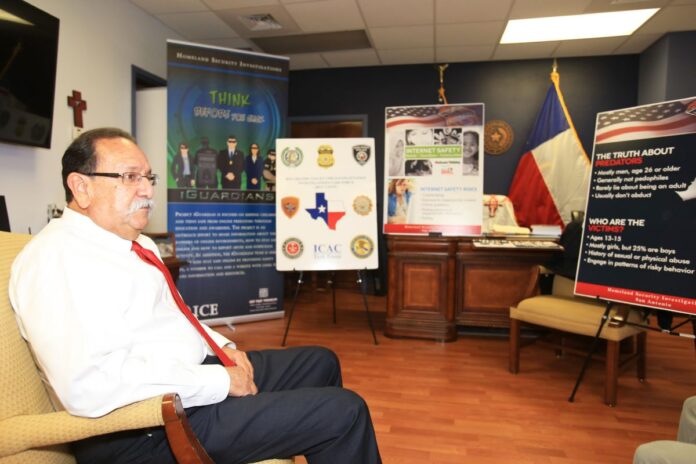BROWNSVILLE — On Feb. 24, 2016, Rio Grande Valley Child Exploitation Taskforce agents descended on a home in Harlingen and ended a nightmare.
During that raid, agents arrested 27-year-old Kevin Kaster, seized the man’s desktop computer and discovered 22 videos of child pornography.
As the investigation progressed, authorities learned that Kaster was sexually abusing a close minor relative who lived in the same home, including creating child pornography of the victim that he shared online.
In state court, Kaster pleaded guilty to indecency with a child and received a 20-year sentence, and to continuing sexual abuse of a minor, receiving a 60-year sentence to prison.
This is the strategy taken by the Child Exploitation Taskforce to stamp down on crimes against children.
One month before Kaster’s arrest, members of Homeland Security Investigations, the U.S. Attorney’s Office, the Cameron County District Attorney’s Office, the Brownsville and Harlingen police departments, the Cameron County Sheriff’s Office and the Brownsville Independent School District Police Department gathered at a news conference to announce the creation of the taskforce.
During the two years that have passed since its inception, the group has reached a remarkable and meaningful achievement: It has rescued 55 children from the hands of sexual predators.
The taskforce’s work is producing results in an era where crimes against children are increasing because of access to cellphones, the internet and social media.
Eddie Hurtado, the HSI supervisory agent in charge, said when he arrived in January of 2015 in the Rio Grande Valley, that there were just three agents working child exploitation cases.
“Every five years our executive associate director in Washington D.C. outlines the way forward for investigations. He prioritizes cases. For the last several years, child exploitation … has been one of the top five priorities,” Hurtado said. “When I got here in January of 2015, we had about three agents working child exploitation, which wasn’t in line with those guidelines.”
So Hurtado got to talking with HSI Special Agent Joseph Guy Baker, one of the original investigators in the Rio Grande Valley who worked child exploitation.
Baker told Hurtado that if more agents were available, they could execute search warrants every week.
“That’s when I came up with the concept of the taskforce,” Hurtado said. “I approached (Cameron County District Attorney Luis V. Saenz) with the idea and, of course, he was immediately supportive.”
Instead of one investigator and one assistant district attorney, Saenz assigned several assistant district attorneys to prosecute the cases.
Now, the taskforce has nine special agents, seven taskforce officers and numerous investigators.
“And the more and more work that we are doing, the word is getting out and we have agencies actually reaching out to us,” Hurtado said.
Recent new partners include the Texas Department of Public Safety, the Raymondville Police Department and the Texas Department of Family Protective Services.
There is no doubt that taskforce members are hard at work catching predators.
They work online and pose as children trying to catch sexual predators who browse social media to groom kids in order to either try to get children to share nude photos with them, which they then distribute online, or to meet in person.
Members of the taskforce execute search warrants and track IP addresses that have downloaded child porn. They testify in court during hearings and trials. They conduct forensic operations on seized electronics.
But the taskforce also spends a significant amount of time in the Valley, educating children on the dangers that lurk behind the click of a mouse on social media through the iGuardian program.
“It’s a program that brings awareness and education to the dangers and risks of using the internet, and to teach kids, parents, teachers, how to identify the red flags associated with these dangers,” Hurtado said.





